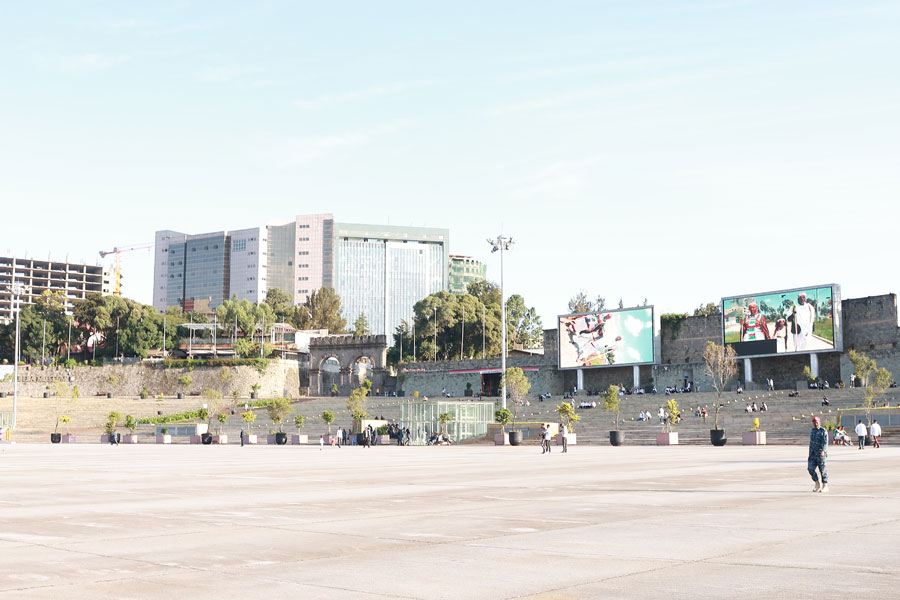
Fortune News | Oct 21,2023
Bahir Dar University has bagged a lucrative contract to prepare a policy regulating safety compliance in construction zones. It is part of a series of reforms the authorities are undertaking to overhaul the construction industry, a source of employment for five percent of the national workforce.
Data on construction workplace injuries are hard to come by. However, surveys conducted in various parts of the country suggest that close to 40pc construction workers suffer occupational injuries. Last year, no less than 20 construction workers died at worksites in Addis Abeba.
Three months ago, the Construction Management Institute awarded the Ethiopian Institute of Architecture, Building Construction & City Development (EiABC) a 2.7 million Br contract to prepare working procedures and legal policy documents for the reforms. The Institute hopes to see the policy encouraging the involvement of subcontractors in the construction industry. Last year, the Ministry of Transport & Logistics invited all public universities to bid for consultancy services and prepare a legal policy framework.
Only Bahir Dar University responded to the call and signed a 64 million Br contract.
The initiative is part of the Transport Systems Improvement Project (TRANSIP), financed by the World Bank for 300 million dollars. Designed to be implemented at the city and federal levels, the project aims to improve construction safety compliance systems and enhance mobility in Addis Abeba by funding road projects. The Ministry implements project components under the federal jurisdiction, while the Addis Abeba City Roads Authority holds the reins in the capital.
Officials hope the University's legal framework will pave the way for introducing occupational health and safety guidelines to be used during the design, tender preparation, and contract implementation stages.
"Despite the growth in the construction industry, occupational safety and health-related issues have been given far too little attention," said Bahiru Mossa, manager of the transport systems improvement project office under the Ministry.
A team of experts selected from the University's civil engineering and water resource management departments are working on the project, Solomon Melaku (PhD), a team leader and lecturer at Bahir Dar University, told Fortune.
He says the University's administrators decided to take up the project to provide a unique learning opportunity for postgraduate students in construction management and engineering. Established in 1996, Bahir Dar University launched the programme two years ago at the graduate and postgraduate levels.
The University is expected to complete the job within a year. Its experts are expected to develop software to monitor the prevalence of occupational injuries.
"We'll outsource the task to our electrical and software engineering faculty," said Solomon.
There are no mandatory safety requirements in construction projects. The legal document is hoped to bridge this gap, says Medina Ahmed, director of construction law at the Ministry of Urban Development & Infrastructure.
In 2019, legal experts at the Addis Abeba Construction Bureau drafted a regulation to address construction workers' concerns about occupational health and safety. But it remains on the drawing board.
However, the Addis Abeba Construction Permit & Control Authority obliges private construction projects to incorporate occupational health and safety outlay in their applications for construction permits. The Authority, which issued 40,000 construction permits last year, conducts inspections on safety guidelines.
The same goes for the city's Construction Bureau, which oversees public projects financed by the City Administration.
"The occupational safety issue must be included in the contracts we administer," said Bizuayehu Guta, director of communications.
Occupational safety issues are covered in the revised labour law and a building proclamation legislated 13 years ago.
Industry players say most construction-related accidents occur due to improper use of scaffolding and form-works. The lack of personal protective equipment is a major cause of workplace accidents.
Zegeye Haileselassie, president of the Ethiopian Construction Industry Workers Association Federation, observes contractors are often reluctant to allocate enough budget to ensure occupational safety despite most construction works being classified as high-risk endeavours.
"Grade-one contractors, in particular, don't allow most of their workers to form labour unions and join the Federation," he said.
His Federation represents 40,000 construction workers.
Although contractors and consultants are required to buy insurance policies fo their workers, the practice remains unheeded, according to Medina.
Insurance industry executives can attest.
"Although workers' compensation insurance is cheap, most contractors don't buy it," said Meseret Bezabih, chief executive officer (CEO) of United Insurance.
The firm paid out 5.3 million Br in workers' compensation claims last year.
Zeratsion Girmay manages Bright Construction Plc, a grade-one contractor of the company incorporated nearly two decades ago. He began taking the issue seriously after his company paid out 170,000 Br in compensation to the family of an employee who died at a worksite five years ago.
"We learned that insurance is necessary to shield ourselves from unexpected costs," said the General Manager.
PUBLISHED ON
Aug 06,2022 [ VOL
23 , NO
1162]

Dec 22 , 2024 . By TIZITA SHEWAFERAW
Charged with transforming colossal state-owned enterprises into modern and competitiv...

Aug 18 , 2024 . By AKSAH ITALO
Although predictable Yonas Zerihun's job in the ride-hailing service is not immune to...

Jul 28 , 2024 . By TIZITA SHEWAFERAW
Unhabitual, perhaps too many, Samuel Gebreyohannes, 38, used to occasionally enjoy a couple of beers at breakfast. However, he recently swit...

Jul 13 , 2024 . By AKSAH ITALO
Investors who rely on tractors, trucks, and field vehicles for commuting, transporting commodities, and f...

Jul 5 , 2025
Six years ago, Ethiopia was the darling of international liberal commentators. A year...

Jun 28 , 2025
Meseret Damtie, the assertive auditor general, has never been shy about naming names...

Jun 21 , 2025
A well-worn adage says, “Budget is not destiny, but it is direction.” Examining t...

Jun 14 , 2025
Yet again, the Horn of Africa is bracing for trouble. A region already frayed by wars...